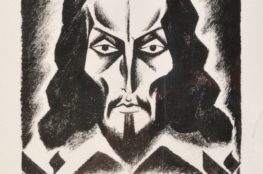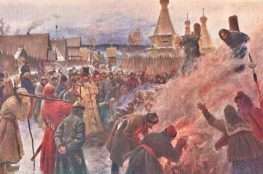I want to wish all readers of this blog a blessed feast of St. Alphonsus Ligouri, founder of the Congregation of the Most Holy Redeemer (Redemptorists). For those following the Novus Ordo calendar, his feast day is today. For those who follow the vetus ordo, his feast is tomorrow (August 2). If you haven’t done so already, consider reading both his The Glories of Mary and Preparation for Death; they are among some of the greatest spiritual works in the history of the Catholic Church. It remains a great shame that most of the English-language volumes of his complete ascetical works are now long out of print, though used copies are readily available. Just be careful which translations you go for, as this helpful blog posts notes. Besides being a great Doctor of the Church, St. Alphonsus spent his life working tirelessly for the salvation of souls. His writings still serve as a guiding light through these dark times when we are so often tempted to set our hearts on worldly things instead of our minds on eternity and our last end. The following text is a summary of his life taken from the pre-1962 Breviarium Romanum.
Alphonsus Mary de’ Liguori was born of a noble family, at Marianella, near Naples, on the 26th day of September, in the year of salvation 1696. From his earliest days he gave no dark signs of holiness. When he was but a babe, his parents carried him to holy Francis de Hieronymo, of the Society of Jesus, and holy Francis, after long prayer, said that the child would live to ninety years of age, that he would become a Bishop, and that he would be a great blessing to the Church. From his childhood, he had a strong distaste to games, and by his entreaty and example, induced the noble pages (of the Court, among whom he served,) to conduct themselves with Christian decency. As a young man, he became a member of divers godly guilds, and made it among his delights to nurse the sick in the hospitals, to spend much time in prayer in the Churches, and often to receive the Holy Sacraments. With his godliness he so joined zeal for learning, that when he was scarcely sixteen years of age he took degrees in Canon and Civil law in the University of Naples. In obedience to the wish of his father, he adopted the profession of an advocate, in which he gained great credit, but, finding dangers in the practice of the law, he entirely gave it up. He declined a very brilliant marriage which was proposed to him by his father, resigned his family inheritance as an eldest son, hung up his sword at the Altar of the Blessed Virgin Mary, styled of Ransom, and surrendered himself altogether to the service of God. He became a Priest, in 1726, and made so zealous an onslaught on sin, running hither and thither in the office of an Apostle, that he accomplished the conversion of multitudes of lost creatures. The poor and the country-people most chiefly roused his compassion, and (in 1742) he founded the Congregation of Priests called that of the Most Holy Redeemer, to follow the Redeemer’s footsteps by preaching the Gospel to the poor throughout the fields, villages, and hamlets.
That he might not turn aside from his work, he bound him- self by a vow never to lose any time. Inflamed with the love of souls, he toiled to gain them to Christ and to amend their lives, not only by preaching of the word of God, but also by writings full of holy learning and godliness. It is a marvel how many hatreds he stilled, and how many backsliders he led again into the paths of salvation. He was eminently devoted to the Mother of God, published a book on her glories, and when he was earnestly speaking thereof in his sermons, it happened more than once that all the people openly saw a strange brightness fall upon him from her image, till all his countenance shone, and he was rapt in an ecstasy. The sufferings of the Lord and the Holy Eucharist were ever before his eyes, and to them he spread abroad a wonderful love. When he was praying before the Altar of the Blessed Sacrament, or celebrating the Holy Liturgy, which he never failed to do every day, through the seraphic violence of his love, he wept burning tears, or shook with strange movements, or became altogether beside himself. He joined a wonderful innocence and purity, which he never polluted by the stain of deadly sin, to a wonderful depth of repentance, and chastised his body with hunger, iron chains, hair-cloth, and scourgings even to blood-shedding. Among all these things he was remarkable for the gift of prophecy, the power of seeing into the hearts of men, the ability to be in more places than one at the same time, and other miracles.
But firmly and perseveringly refused all high places in the Church which were offered him, but (in 1762) Pope Clement XIII. absolutely commanded him to take the Bishoprick of the Church of Santa Agata de’ Goti. On becoming a Bishop, the only change which he made in the hardness of his life was that of his outer raiment. There remained, too, the same simplicity of meats, the same strong zeal for Christian discipline, the same determined will to put down sin and keep out false doctrines, and the same earnestness in all the duties of a shepherd of souls. In his tenderness to the poor, he spent among them all the revenues of his Church, and in a year of famine sold the furniture of his own house to feed his starving people. He was all things to all men and brought nuns to lead a more perfect life, while he saw to it that a monastery was opened for nuns attached to his own Congregation. On account of grievous and continual sickness, he resigned his Bishoprick, and poor as when he had left them, poor he returned among his disciples. On the 1st day of August, in the year 1787, he peacefully died at Noceradei – Pagani, amid the tears of his followers. He was then ninety years of age his body was worn out with old age and hard work, and with chronic gout, and other painful maladies, but the freshness of his mind never failed to the last, in talking and writing on heavenly things. In the year 1816 Pope Pius VII., finding him famous on account of his good works and miracles, enrolled his name among those of the Blessed. God still glorified him by new signs and wonders, and on the Feast of the Most Holy Trinity, in the year 1839, Gregory XVI., with solemn pomp, numbered him among the Saints of the Church. Lastly, Pope Pius IX., in accordance with a Resolution of the Congregation of Sacred Rites, gave him the title of Doctor of the Universal Church.



